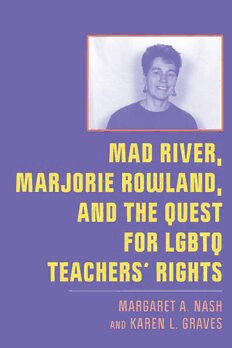
Mad River, Marjorie Rowland, and the Quest for LGBTQ Teachers’ Rights PDF
Preview Mad River, Marjorie Rowland, and the Quest for LGBTQ Teachers’ Rights
Mad River, Marjorie Rowland, and the Quest for LGBTQ Teachers’ Rights New Directions in the History of Education Series editor, Benjamin Justice The New Directions in the History of Education series seeks to publish innovative books that push the traditional bound aries of the history of education. Topics may include social movements in education; the history of cultural repre sen tat ions of schools and schooling; the role of public schools in the social production of space; and the perspectives and experiences of African Americans, Latinx Americans, women, queer folk, and others. The series will take a broad, inclusive look at Ameri- can education in formal settings, from prekindergarten to higher education, as well as in out- of- school and informal settings. We also invite historical scholarship that informs and challenges popu lar conceptions of educational policy and policy mak- ing and that addresses questions of social justice, equality, democracy, and the for- mation of popu lar knowledge. Dionne Danns, Crossing Segregated Bound aries: Remembering Chicago School Desegregation Sharon S. Lee, An Unseen Unheard Minority: Asian American Students at the University of Illinois Margaret A. Nash and Karen Graves, Mad River, Marjorie Rowland, and the Quest for LGBTQ Teachers’ Rights Diana D’Amico Pawlewicz, Blaming Teachers: Professionalization Policies and the Failure of Reform in American History Kyle P. Steele, Making a Mass Institution: Indianapolis and the American High School Mad River, Marjorie Rowland, and the Quest for LGBTQ Teachers’ Rights MARGARET A. NASH AND KAREN L. GRAVES Rutgers University Press New Brunswick, Camden, and Newark, New Jersey, and London 978-1-9788-2751-6 (cloth) 978-1-9788-2750-9 (paper) 978-1-9788-2752-3 (e-pub) Cataloging-in-publication data is available from the Library of Congress. LCCN 2021050027 A British Cataloging- in- Publication rec ord for this book is available from the British Library. Copyright © 2022 by Margaret A. Nash and Karen Graves All rights reserved No part of this book may be reproduced or utilized in any form or by any means, electronic or mechanical, or by any information storage and retrieval system, without written permission from the publisher. Please contact Rutgers University Press, 106 Somerset Street, New Brunswick, NJ 08901. The only exception to this prohibition is “fair use” as defined by U.S. copyright law. References to internet websites (URLs) were accurate at the time of writing. Neither the author nor Rutgers University Press is responsible for URLs that may have expired or changed since the manuscript was prepared. Chapter 1 adapted with permission from Graves, K., Nash, M. A. (2018). Staking a Claim in Mad River: Advancing Civil Rights for Queer America. In D. A. Santoro & L. Cain (Eds.), Principled Resistance: How Teachers Resolve Ethical Dilemmas, pp. 171–185. Cambridge, MA: Harvard Education Press. Copyright © 2018 The President and Fellows of Harvard College. The paper used in this publication meets the requirements of the American National Standard for Information Sciences— Permanence of Paper for Printed Library Materials, ANSI Z39.48-1992. www . rutgersuniversitypress . org Manufactured in the United States of Amer i ca Dedicated to Marjorie Rowland and to all the brave LGBTQ educators, past and pre sent. There is no pos si ble conflict between the interest of the child and the interest of the teacher. . . . F or both the child and the teacher freedom is the condition of development. The atmosphere in which it is easiest to teach is the atmosphere in which it is easiest to learn. The same things that are a burden to the teacher are a burden also to the child. The same things which restrict her powers restrict his powers also. —M ARGARET A. HALEY, 1904 Contents Preface ix 1 Staking a Claim in Mad River 1 2 “I Had to Be the Fighter” 15 3 The Meaning of Mad River: Implications of the Case 41 4 “Coming Out of the Classroom Closet”: LGBTQ Teachers’ Lives after Mad River 61 5 Movements Forward and Back 82 Acknowl edgments 93 Notes 95 Bibliography 115 Index 127 vii Preface In 1974, a high school principal asked a guidance counselor who identified as bisexual to resign. She refused, confident that she was good at her job, that she helped students, and that the principal was wrong to ask her to resign simply because of her sexuality. Eventually a jury and some judges agreed with her, but a majority of judges did not. The counselor, Marjorie Rowland, lost her job and never worked in a school setting again. Rowland’s story took place outside of Dayton, Ohio, but it could have happened almost anywhere. It did happen almost anywhere, for de cades, including in the pre sent day. Unbeknownst to Rowland, other educators were facing similar situations. Some of them took their cases to court, while others did not have the financial or emotional resources to fight what seemed like an inevitably losing battle. Rowland did choose to fight, backed with the institutional support of the National Education Association, which had just recently included sexual orientation in its category of protected groups. Her case is impor tant, not just b ecause she chose to pursue justice but because it led to a written statement by U.S. Supreme Court Justice William Brennan. While Brennan’s statement changed nothing for Row- land, it became a foundation for other civil rights cases for LGBTQ people. This book is the story of what happened to Marjorie Rowland, how it hap- pened, and why it m atters. LGBTQ p eople have made great gains toward social, po liti cal, and legal equality in recent years, and these gains are to be celebrated. But there also have been tremendous backlash, targeted vio lence, and some erosion ix
